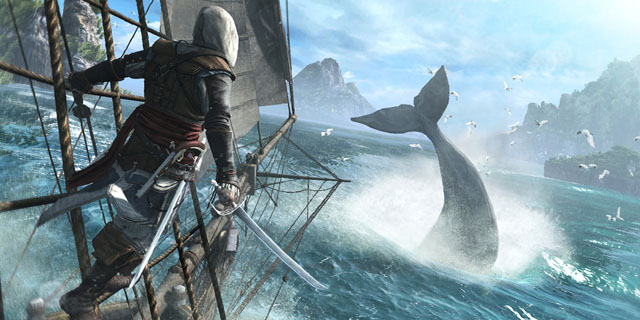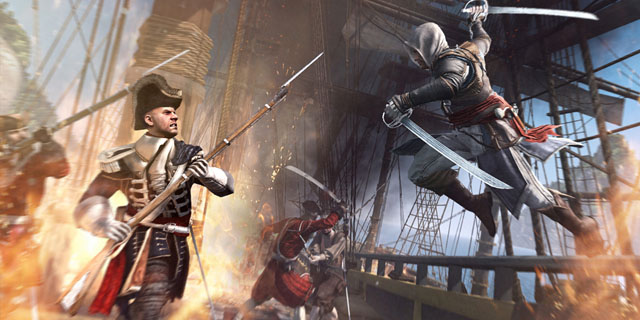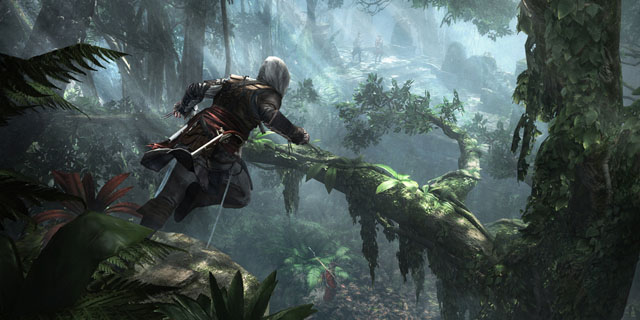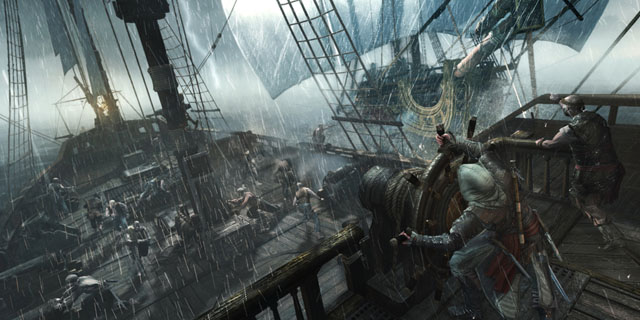
Assassin’s Creed IV: Black Flag, more than any other game I’ve ever played, is less of a game and more a collection of toys that happen to have a story connecting them. Regardless of where I’m sending Edward or why, my face erupts into a huge smile every time I hit traveling speed and the crew of the Jackdaw breaks out into song. Just like I did with The Legend of Zelda: The Wind Waker, I could sail the seas for hours, take in the sights and feel like my time was well-spent. It’s only improved by listening to excellent renditions of “Drunken Sailor” and “Spanish Ladies” while I marvel at the beautiful scenery created by Ubisoft.
When I’m not engrossed in sailing and singing, I’m busy pulling up the spyglass, spotting a ship on the horizon and moving in to engage. Naval battles were tremendous fun in Assassin’s Creed III, and they’re worlds better here. The Jackdaw is nimble, her upgrades are numerous and the updates to the combat controls all make perfect sense. Firing broadsides is for doing heavy damage, firing from the fore launches chain shot for disabling foes, swivel cannons are used for precise strikes on critical and exposed areas and explosive barrels can be dropped behind you to discourage any and all pursuers.
Beating ships rewards you with the ship’s cargo, which you’ll sell to the harbormaster in the case of things like sugar and rum or use to upgrade your ship in the case of things like wood and metal. Winning engagements also allows you to repair the Jackdaw, lower your wanted level or add the ship to your fleet. Naval combat remains fun and engaging throughout, and I found myself taking part every time I was at sea.

Wanted level on the sea is not only unrelated to your wanted level on land, but the notoriety system of games’ past has been completely overhauled. You’re either being hunted or you’re not. There are no wanted posters to take down, no criers to bribe and then pickpocket (though you can bribe the local agent on land to reduce your wanted level on sea), and killing all of your attackers is a legitimate tactic for getting out of hot water with the local authorities. What this really means is that you can play Edward the way you’d expect to play him: as a carefree pirate who is prone to get in a fight and can hold his own against a large group. He’s wearing two swords and up to four pistols, and the overhauled notoriety system lets you cut loose and use all of the tools at your disposal.
That’s not to say that Edward can’t be stealthy when the situation calls for it. Low bushes are plentiful and make stealth viable, and Edward’s blow pipe and berserk darts are a great revival of Ezio’s poison darts in Assassin’s Creed II. Stalking your target, watching guard patterns and developing a plan of attack evoke the original Assassin’s Creed without suffering from the fatigue of repetitive missions that plagued it.

Assassin’s Creed IV has also grabbed me in a way that no other game in the series has save Assassin’s Creed II. Any time side objectives popped up, I wanted to complete them, and it paid off as I was never short on money or supplies. This doesn’t mean that I got 100% synchronization on every mission, but climbing up viewpoints to reveal the map meant revealing side activities like assassination contracts, collecting shanties to be sung by the crew of the Jackdaw, finding messages in bottles, finding treasure maps, finding the treasure from those maps on other islands, looting every chest in the Caribbean, collecting animus fragments, underwater looting and hunting the local sharks, whales, ocelots, and alligators.
Hunting is vital, because Assassin’s Creed IV took some cues from Far Cry 3. After you’ve killed and skinned to ocelots and two iguanas, you can use those to craft a health upgrade and an additional pistol holster. Other upgrades come from resources gathered by hunting different animals.
The narrative is best left unspoiled, but don’t worry. Series mainstays Assassins and Templars are here in full force, duking it out for control of an artifact of the First Civilization, and there’s sci-fi shenanigans going on in the modern day. The framing device is interesting and a breath of fresh air after five games of Desmond on the run from the Templars. What’s really important though, and where you’ll spend 95% of your time, is that the pirate mechanics and sheer breadth of available ways to have fun are amazing.

Edward controls great whether he’s on foot or at the helm of the Jackdaw, and whether you’re after an interesting story or just a fun open-world pirate game, Assassin’s Creed IV: Black Flag has got you covered.
Pros: Stunning world full of fun activities, tremendously engaging naval combat, Edward Kenway is fun to play
Cons: Areas and upgrades are gated by story progress



















